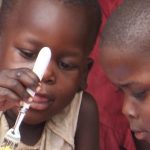Ethiopia is one of the poorest, most populous, and largest countries in Africa. It has suffered challenging conditions over the past several decades—such as the 1984 drought combined with civil war that resulted in a catastrophic famine. Over the years, Ethiopia has received a large share of Africa’s emergency food aid. In 2005, the Government >> Read more
UK (Department for International Development)
A longstanding partner to IFPRI, the United Kingdom’s Department for International Development (DFID) is the largest bilateral donor to development-focused research. As such, DFID fosters the new technologies and ideas that are essential to tackling some of our greatest challenges. In June 2002, the International Development Act made poverty reduction the official focus of DFID’s work, and the department has risen to meet the challenge. DFID’s support has contributed to IFPRI’s work tackling root causes of hunger, particularly in Africa. It emphasizes improving agricultural productivity and innovation, promoting climate change resiliency, and ensuring food and nutrition security through cash transfers, biofortification, and other means. In 2010, IFPRI’s collaborated with DFID’s Foresight Food and Farming study that produced innovative evidence on the increasing pressure on the global food system.
Recently at IFPRI’s 40th Anniversary event, Tim Wheeler, Deputy Chief Scientific Adviser for DFID shared how IFPRI’s evidence-based research has impacted the agency and its work towards food and nutrition security. He said, “IFPRI has been at the forefront of many aspects of development…successful in elevating debates to high-level policymakers transforming development packages.”
For more on the projects that IFPRI and DFID partnered together, please go to this brochure.
HarvestPlus: Reducing micronutrient malnutrition
Since 2004, alongside 70 partner organizations in more than 40 countries, HarvestPlus, which is supported by several transformational donors including the United Kingdom’s Department for International Development (DFID), has sought to reduce micronutrient malnutrition through biofortification. This means conventionally breeding staple food crops with higher levels of key micronutrients—namely, iron, vitamin A, and zinc—identified by >> Read more
IFPRI & DFID: 30 years of Making a Difference
IFPRI’s work in providing cutting-edge research on food and nutrition security has long depended on strategic partnerships with donors, universities, research organizations, and others around the world. One of the Institute’s key collaborators is the United Kingdom’s Department for International Development (DFID), which has served as a strategic and collaborative donor and partner to IFPRI for more than 30 years.
Highlights of IFPRI and DFID Partnership
For more than 40 years, the International Food Policy Research Institute (IFPRI) has been providing cutting-edge research and policy options on food and nutrition security to partners in donor and recipient countries around the world.
Innovation in Insurance: Managing the Risky Business of Weather
On March 29-30, 2017, the Chicago Council on Global Affairs will host the Global Food Security Symposium in Washington, D.C. IFPRI has been helping design and evaluate index insurance products to aid farmers in mitigating the impact and managing the risks associated with severe weather and crop loss.
Enhancing South-South Learning: From Brazil to Africa
Brazil has made impressive progress in reducing poverty. Rural poverty has been cut almost in half, from 51 percent in 2002 to 29 percent in 2011, and family farmers’ incomes grew by 50 percent. These results were achieved partially through Fomento, a set of government-run social programs targeting smallholder farmers. When a program shows such >> Read more


